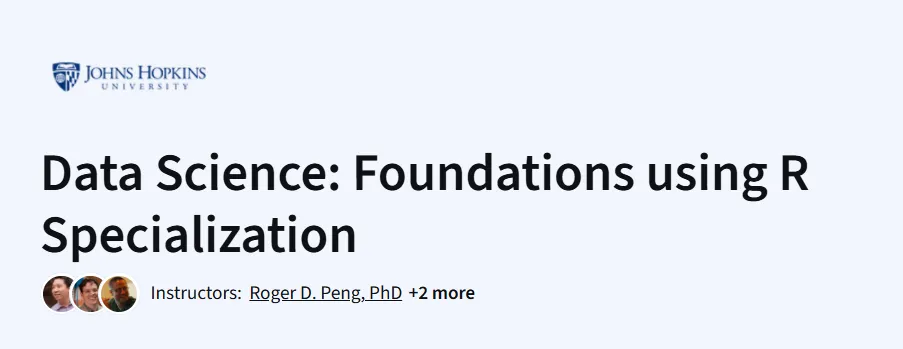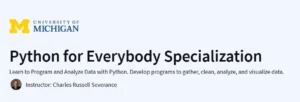What will you learn in Data Science: Foundations using R Specialization Course
Learn to clean, analyze, and visualize data using R.
Get comfortable with asking the right questions, accessing data, and ensuring your research is reproducible.
Use GitHub to manage your data science projects and collaborate effectively.
Gain deep skills in using RStudio, version control, RMarkdown, and ggplot2 for data storytelling.
Program Overview
Course 1: The Data Scientist’s Toolbox
⌛ 17 hours
Topics: Set up R, RStudio, Git, and GitHub. Learn basic study-design concepts. Understand data, problems, and tools used in data science.
Hands-on: Create your toolbox. Set up software. Make a GitHub repository and explore essential tools.
Course 2: R Programming
⌛ 57 hours
Topics: Install and configure R environments. Learn R syntax, loops, functions, debugging, and profiling. Read and write data in R.
Hands-on: Complete programming and debugging tasks. Explore data via R functions and code organization. Class
Course 3: Getting and Cleaning Data
⌛ 20 hours
Topics: Acquire data from web, APIs, databases, and other sources. Learn data cleaning and tidying (creating tidy data). Understand datasets, codebooks, and processing steps.
Hands-on: Obtain and clean real data. Create tidy datasets and document the data-processing workflow
Course 4: Exploratory Data Analysis
⌛ 1–2 hours
Topics: Learn visualization and summary techniques. Understand trends, patterns, and relationships in data.
Hands-on: Apply exploratory methods on real-world data. Generate visual summaries using real datasets.
Course 5: Reproducible Research
⌛ 7–8 hours
Topics: Understand reproducible research and its importance. Learn tools like R Markdown for literate programming.
Hands-on: Publish analysis as a single document that includes code and results for reproducibility.
Get certificate
Job Outlook
A strong foundation for roles like Data Analyst, Junior Data Scientist, or Research Assistant—especially in environments that use R.
Helps bridge into more advanced study or specializations, such as “Data Science: Statistics and Machine Learning.”
Build real-world-ready skills prized at academic and industry levels—like GitHub version control, reproducibility, and tidy data practices.
Specification: Foundations of Global Health Specialization
|





